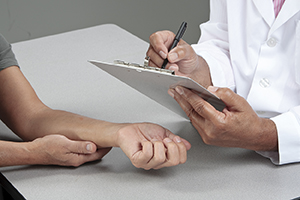Tuberculosis (TB) is a bacterial disease that spreads through the air. A person with TB of the throat or lungs who coughs, speaks, or sings can unknowingly spread the bacteria into the air. Uninfected people nearby can breathe in the TB bacteria and be infected.
TB can cause serious health problems. To protect your health, get tested.
Important
Whether you have active TB disease or simply test positive for TB infection, you must see a healthcare provider for an exam and treatment.
Who should be tested?
Anyone can be exposed to TB. But some people are more likely to be exposed:
-
People who live in countries with high TB rates
-
Healthcare providers
-
People who have lived in a homeless shelter or on the street
-
People who have been incarcerated
Older adults and people with HIV and AIDS or other immune-weakening conditions are less able to fight off infections such as TB. They're also more likely to get TB. If you’re at risk for exposure or at increased risk for disease after exposure, get tested regularly.
TB tests
Your healthcare provider will choose which TB test to use. Factors in selecting which test to use include the reason for testing, test availability, and cost. Generally, it is not recommended to use both a TB skin test and a TB blood test.
-
Skin test. The TB skin test tells you if the TB bacteria are in your body. A small amount of solution is put under the skin with a needle. This is done to see if a reaction occurs, such as a red swelling with redness around it.
-
Blood test. Blood is drawn and sent to a lab for testing.
-
Other tests. If you're being evaluated for active TB, a sample may be taken of the mucus that comes up when you cough (sputum). Or some other tissue or body fluid sample may be taken. It's then tested for TB.
Getting your TB test results
After the placement of a TB skin test,
What the test results mean
-
Negative results. These mean you likely don’t have the TB bacteria in your body. But in people with some long-term (chronic) illnesses, the TB tests can be negative even if there's TB in the body.
-
Positive results. These mean that you may have been infected with the TB bacteria. This doesn’t necessarily mean you have active TB disease. You'll need more tests, such as chest X-rays, to find out if you have active TB disease. If you don't have active TB, then you are said to have latent TB infection. Latent TB means you have the germs in your body, but they are not harming you. Latent TB germs cannot be spread to other people.


